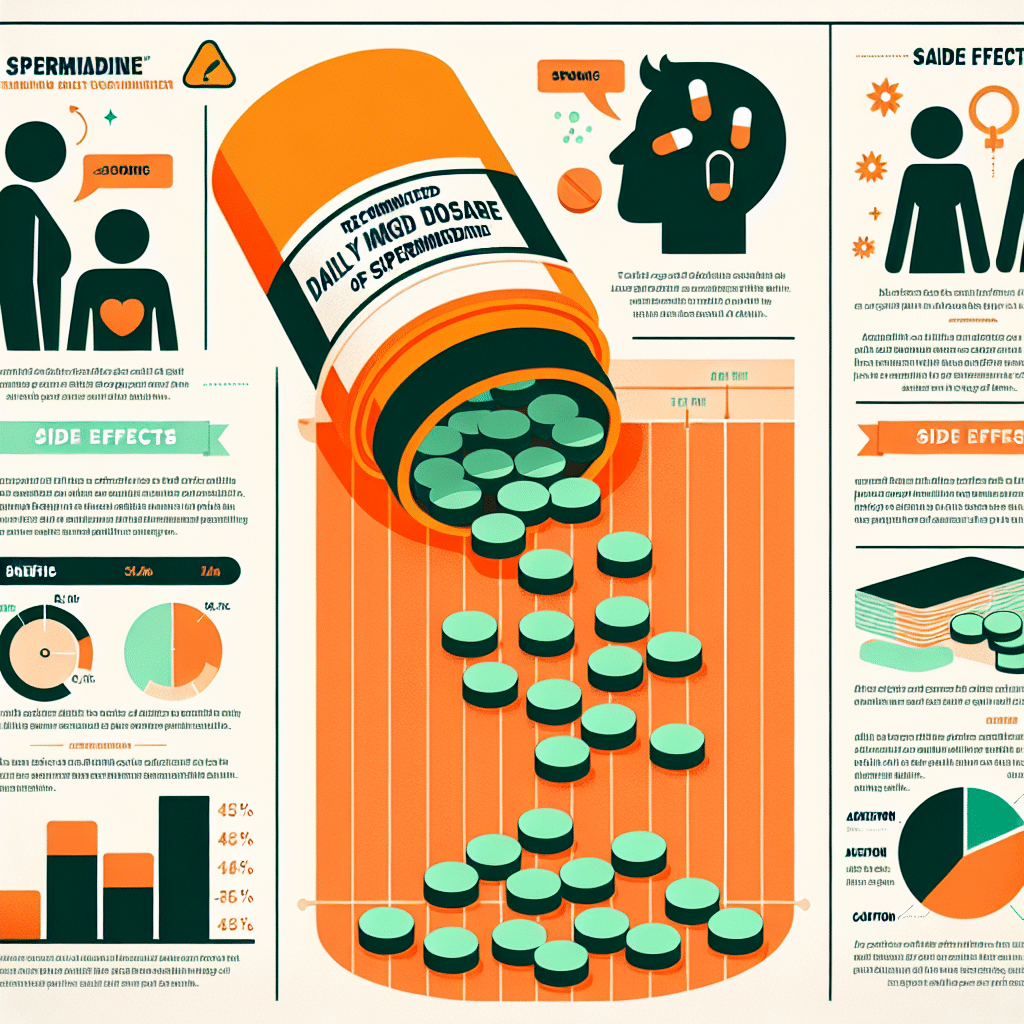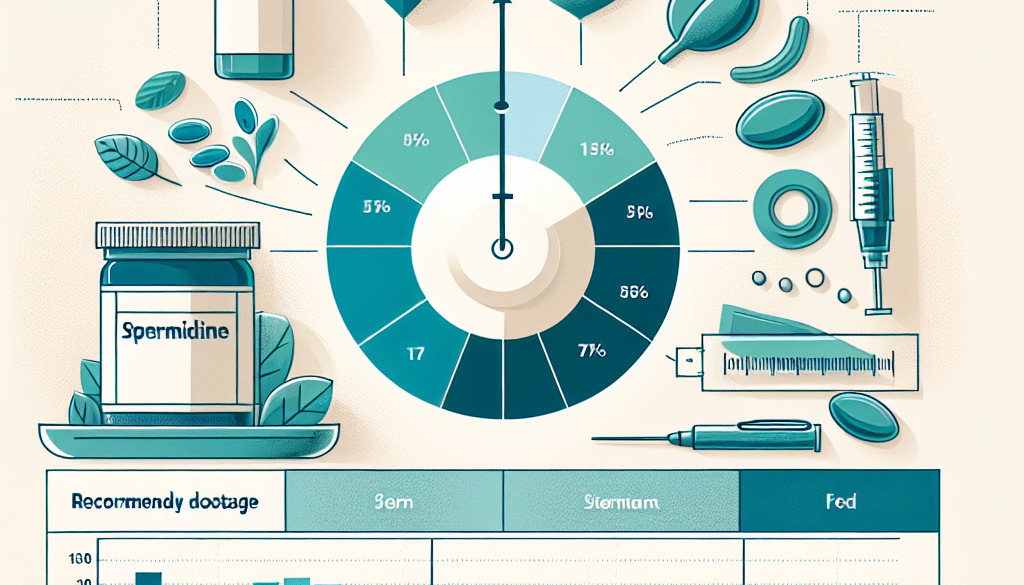Spermidine Dosage Per Day: Recommended Amounts
-
Table of Contents
- Spermidine Dosage Per Day: Understanding Recommended Amounts
- What is Spermidine?
- Health Benefits of Spermidine
- Recommended Spermidine Dosage
- Research and Case Studies on Spermidine Dosage
- Considerations and Precautions
- Conclusion: Balancing Spermidine Intake for Optimal Health
- Enhance Your Health with ETprotein’s Premium Protein Products
Spermidine Dosage Per Day: Understanding Recommended Amounts

Spermidine, a naturally occurring polyamine, has garnered significant attention in the health and wellness community for its potential anti-aging and health-promoting benefits. As research continues to unfold, many individuals are seeking guidance on the optimal daily dosage of spermidine to reap its purported benefits. This article delves into the current understanding of spermidine, its health implications, and the recommended daily dosages based on scientific evidence.
What is Spermidine?
Spermidine is a compound found in a variety of foods such as aged cheese, mushrooms, soy products, legumes, and whole grains. It plays a crucial role in cellular processes, including cell growth, proliferation, and survival. Research suggests that spermidine may have anti-inflammatory, neuroprotective, and cardioprotective properties, and it may also promote autophagy, the body’s process of cleaning out damaged cells to regenerate newer, healthier cells.
Health Benefits of Spermidine
Before discussing the recommended dosage, it’s important to understand why spermidine supplementation might be considered. Here are some of the key health benefits associated with spermidine:
- Longevity: Studies have linked spermidine intake with increased lifespan in various organisms, including yeast, worms, flies, and mice. The potential for these effects in humans is an area of ongoing research.
- Cardiovascular Health: Spermidine may improve heart function and reduce the risk of cardiovascular disease by lowering blood pressure and exerting a protective effect on the heart muscle.
- Neuroprotection: There is evidence to suggest that spermidine can help protect against neurodegenerative diseases by promoting neuronal growth and reducing inflammation in the brain.
- Cancer Prevention: Some studies have shown that spermidine can induce autophagy, which may help prevent cancer cell growth and proliferation.
- Improved Metabolic Health: Spermidine has been associated with improved insulin sensitivity and may help in the management of metabolic disorders such as diabetes.
Recommended Spermidine Dosage
As of my knowledge cutoff in 2023, there is no universally agreed-upon dosage of spermidine for humans. However, research has provided some insights into the amounts that might be beneficial. It’s important to note that spermidine dosages can vary based on individual health status, age, and dietary intake. Here are some general guidelines:
- Dietary Intake: For those looking to increase spermidine intake through diet, consuming spermidine-rich foods is a natural way to do so. The average dietary intake of spermidine varies between 5 to 15 mg per day, depending on dietary habits.
- Supplementation: Spermidine supplements are available for those who may not get enough from their diet. Supplemental dosages typically range from 0.5 to 2 mg per day, although some studies have used higher amounts under medical supervision.
It’s crucial to consult with a healthcare provider before starting any new supplement regimen, especially at dosages higher than what is typically found in the diet.
Research and Case Studies on Spermidine Dosage
Several studies have explored the effects of spermidine at different dosages. For instance, a study published in the journal “Nature Medicine” found that mice supplemented with spermidine showed improved heart function and extended lifespan. Human studies are more limited, but ongoing research aims to establish clearer dosage guidelines.
Case studies involving individuals with specific health conditions have also provided insights into spermidine’s therapeutic potential. However, these are individual instances and should not be taken as general recommendations.
Considerations and Precautions
While spermidine is generally considered safe, especially when consumed through dietary sources, there are some considerations to keep in mind:
- High doses of spermidine supplements may cause gastrointestinal discomfort or other side effects.
- Individuals with pre-existing health conditions should consult with a healthcare provider before taking spermidine supplements.
- Pregnant or breastfeeding women should be cautious and seek medical advice before supplementing with spermidine.
Conclusion: Balancing Spermidine Intake for Optimal Health
In conclusion, while spermidine shows promise for various health benefits, the optimal daily dosage is not yet firmly established. Incorporating spermidine-rich foods into your diet is a safe and natural way to increase your intake. For those considering supplements, it’s essential to consult with a healthcare professional to determine the appropriate dosage for your individual needs. As research progresses, we can expect more definitive guidelines on spermidine supplementation.
Enhance Your Health with ETprotein’s Premium Protein Products
If you’re looking to complement your spermidine intake with high-quality protein sources, ETprotein offers a range of organic bulk vegan proteins that can support your health and wellness goals. Their products are non-GMO, allergen-free, and come with the assurance of purity and quality. Whether you’re involved in sports nutrition, weight management, or simply seeking to improve your overall dietary intake, ETprotein has a protein solution for you.
About ETprotein:
ETprotein, a reputable protein and L-(+)-Ergothioneine (EGT) Chinese factory manufacturer and supplier, is renowned for producing, stocking, exporting, and delivering the highest quality organic bulk vegan proteins and L-(+)-Ergothioneine. They include Organic rice protein, clear rice protein, pea protein, clear pea protein, watermelon seed protein, pumpkin seed protein, sunflower seed protein, mung bean protein, peanut protein, and L-(+)-Ergothioneine EGT Pharmaceutical grade, L-(+)-Ergothioneine EGT food grade, L-(+)-Ergothioneine EGT cosmetic grade, L-(+)-Ergothioneine EGT reference grade and L-(+)-Ergothioneine EGT standard. Their offerings, characterized by a neutral taste, non-GMO, allergen-free attributes, with L-(+)-Ergothioneine purity over 98%, 99%, cater to a diverse range of industries. They serve nutraceutical, pharmaceutical, cosmeceutical, veterinary, as well as food and beverage finished product distributors, traders, and manufacturers across Europe, USA, Canada, Australia, Thailand, Japan, Korea, Brazil, and Chile, among others.
ETprotein specialization includes exporting and delivering tailor-made protein powder and finished nutritional supplements. Their extensive product range covers sectors like Food and Beverage, Sports Nutrition, Weight Management, Dietary Supplements, Health and Wellness Products, and Infant Formula, ensuring comprehensive solutions to meet all your protein needs.
As a trusted company by leading global food and beverage brands and Fortune 500 companies, ETprotein reinforces China’s reputation in the global arena. For more information or to sample their products, please contact them and email sales(at)ETprotein.com today.














